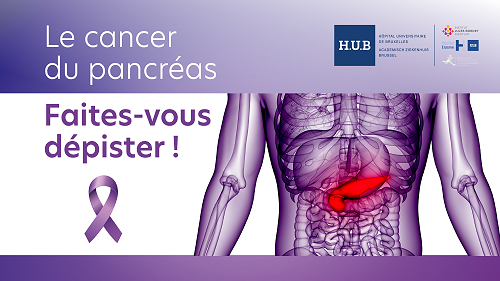"EARLY PANC": Pancreatic cancer screening
Press release 17/11/2022
"EARLY PANC": Pancreatic cancer, an essential screening for persons at risk
17 November 2022, world pancreatic cancer day, is the ideal occasion to get screened. The aim of a personalised screening is to inform and raise awareness among the general public of a cancer that remains poorly understood as the number of cases continues to rise. It is now the fourth most common cancer worldwide.
This silent and progressive disease is today one of the most feared as it is often diagnosed at an advanced stage, thereby complicating treatment and making the survival prognosis very bleak.

Early screening can increase the survival rate
The aim of screening for pancreatic cancer is to detect tumours or their precursors at an earlier stage among individuals at risk of developing the disease. This can make it possible to increase the option of surgery from 20% to 75% of cases with the hope of increasing the five-year survival rate.
Pancreatic cancer is a cancer with a poor prognosis. What is more, its incidence is increasing with 10-12 cases per 100,000 population in Belgium. Like colon cancer, which develops from polyps, pancreatic cancer develops from precancerous lesions, some in the form of pancreatic cysts. In 85% of cases the pancreatic cancer diagnosis comes too late, which explains the very bleak prognosis. At present, only 10% of patients who receive a pancreatic cancer diagnosis survive for five years and just 20% of pancreatic cancers are localised and can be operated on with a view to healing.
Who should be screened for pancreatic cancer?
- All persons aged over 50 with a family history of pancreatic cancer, that is, with at least two first degree relatives (parents, children, brothers/sisters) who have had pancreatic cancer or at least three relatives (irrespective of degree of kinship) who have had pancreatic cancer.
- All persons aged over 30 with a chronic hereditary pancreatitis, whether or not with cystic fibrosis.
- All persons with a hereditary predisposition to cancers (colon, breast, ovaries, and melanoma) with identified mutations and at least one relative diagnosed with pancreatic cancer.
Who is organising the screening?
At the Brussels University Hospital (H.U.B.) we offer a Fast Track care route for pancreatic cancer diagnosis/screening for all persons with a clinical suspicion (alarm symptom or above risk categories) or an unexplained radiological anomaly.
Practicalities
On the occasion of this world pancreatic cancer day we stress the importance of early screening and diagnosis.
This is why the Brussels University Hospital (H.U.B.) has organised a consultation specifically dedicated to the screening and rapid diagnosis of pancreatic cancer at the sites of the Erasmus Hospital and the Jules Bordet Institute. At these consultations you will be informed of all aspects of the problem and your risk can be assessed in terms of genetic factors.
Do you want to get screened?
- Erasmus Hospital:
- Gastroenterology and Medico-Surgical Pancreatology Consultation: +32 (0)2 555 35 04 – +32 (0)2 555 43 50
- Digestive Oncology and Digestive Tumour Screening Consultation: +32 (0)2 555 39 40
- Jules Bordet Institute:
- Digestive Oncology and Pancreatic Tumour Screening Consultation: +32 (0)2 541 34 80
- Onco-Genetic Consultation: +32 (0)2 555 64 30 – +32 (0)2 555 36 48 – +32 (0)2 555 41 92
- Lothier polyclinic: +32 (0)2 221 87 11
- Press contact
- Press responsible : Alexandra Cazan
- E-mail : alexandra.cazan@bordet.be + communication@hubruxelles.be
- Tel : +32 (0)2 541 38 89
- Mob : +32 (0) 493 16 74 79
- Press officer : Gabrielle Vanhoudenhove
- E-mail : gabrielle.vanhoudenhove@erasme.ulb.ac.be + communication@hubruxelles.be
- Tel : +32 (0)2 555 83 95
- Press responsible : Alexandra Cazan
ABOUT THE H.U.B
The Brussels University Hospital (H.U.B.) is the Academic Hospital of the Brussels Free University (ULB) that since 2021 has grouped together the Jules Bordet Institute, the Erasmus Hospital and the Queen Fabiola Children's University Hospital (HUDERF) As a reference centre at international level, located at the heart of the Brussels Region, the H.U.B. provides general, oncological and paediatric care of the highest quality.
Accessible to all, the excellence of care is enriched and nourished by a combination of scientific research and the training of our future nurses.
In 2022, the H.U.B has a staff of 6,000, each and every one inspired by the values of Patients' Interests, Team Spirit, Commitment, Solidarity, Diversity and Inclusion, and Free Inquiry.